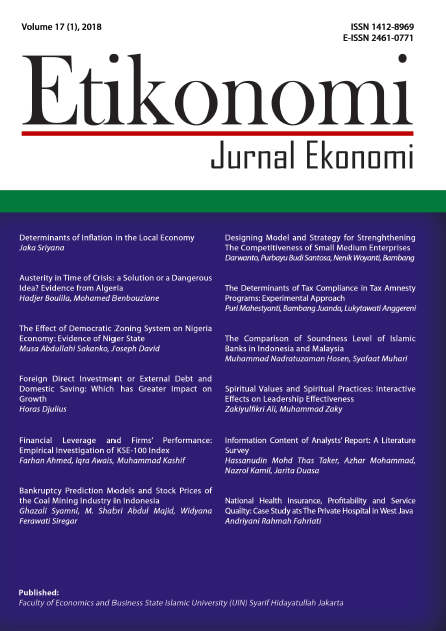The Determinants of Tax Compliance in Tax Amnesty Programs: Experimental Approach
DOI:
https://doi.org/10.15408/etk.v17i1.6966Keywords:
tax amnesty, tax compliance, variance analysis, experimental approachAbstract
In an effort of searching for a new source of revenue for funding the infrastructure development for Indonesia, the government chose to do tax amnesty in 2016. This research was conducted to study the effects of factors (wealth, tariff periods, tax penalties, and audit probability) towards tax compliance. Tax compliance measured from the number of units reported by taxpayers, the amount of value indicated by taxpayers, and participation from taxpayers. The study uses primary data that generated through experimental economics. The methods used are Variance Analysis. The result showed that the taxpayer with higher income has lower compliance rather than the taxpayer from lower income. The taxpayers prefer to report their assets at lower rates. The effort of enforcement from the government by implementing tax penalties and audit probability shows greater effect towards tax compliance.
Downloads
References
Alm, J., McKee, M.J., & Beck, W. (1990). Amazing Grace: Tax Amnesties and Compliance. National Tax Journal. Vol. 43(1): 23-27.
Alm J., & Beck, W. (1993). Tax Amnesties and Compliance in the Long run: A Time Series Analysis. National Tax Journal. Vol. 46: 53-60.
Le Borgne, E., & Baer, K. (2008). Tax Amnesties: Theory, Trends, and Some Alternatives. Washington DC: International Monetary Fund.
Christian, C.W., Gupta, S., & Young, J.C. (2002). Evidence on Subsequent Filling from the State of Michigan’s Income Tax Amnesty. National Tax Journal. Vol. 55(4): 703-721.
Fischer, R., Goddeeris, J.H., & Young, J.C. (1989). Participation in Tax Amnesties: The Individual Income Tax. National Tax Journal. Vol. 42 (1): 15-27.
Friedman, D., & Sunder, S. (1994). Experimental Methods: A Premier for Economist. Melbourne: Cambridge University Press.
Juanda, B. (2009). Metode Penelitian Ekonomi dan Bisnis (Research Method for Economics and Business). (2nd Ed). Bogor: IPB Press.
Juanda, B., Ridiawati, I., & Maryati. (2010). Kajian Tingkat Kepatuhan Pajak dalam Sistem Self-Assesment dengan Metode Eksperimen (Tax Compliance Review in Self-Assessment System with Experimental Method). Working Paper. Departement of Economics, IPB.
Joulfaian, D. (1988). Participation in Tax Amnesties: Evidence from a State. Proceedings of the Eighty-First Annual Conference on Taxation. Washington DC: National Tax Associations.
Malik, A.S., & Schwab, R.M. (1991). The Economics of Tax Amnesties. J. of Public Economics. Vol. 46(1): 29-49. DOI: https://doi.org/10.1016/0047-2727(91)90063-8.
Mikesell, J., & Ross, J. (2012). Fast Money? The Contribution of State Tax Amnesties to Public Revenue. National Tax Journal. Vol. 65(3): 529-562.
Parle, W.M., & Hirlinger, M. (1986). Evaluating The Use of Tax Amnesty by State Government. Public Administration Review. Vol. 46: 246-255.
Purnomolastu, N. (2017). Comparison of Tax Amnesty Implementation in Developing Countries (Comparison Study of Tax Amnesty Implementation Between Indonesia and India 2016). Jurnal Bisnis Terapan. Vol. 1(1): 77-86.
Ragimun. (2014). Analisis Implementasi Pengampunan Pajak di Indonesia (Analysis of Tax Amnesty Implementation in Indonesia). Jurnal Kemenkeu RI. Retrieved from: https://www.kemenkeu.go.id/sites/default/files/analisis%20implementasi%20tax%20amnesty%20di%20indonesia.pdf.
Ross J.M. (2012). Forgiveness is Divine, But is it Good Tax Policy?. SPEA Insight. Indianapolis: School of Public Policy and Environmental Affairs. Retrieved from: https://spea.indiana.edu/doc/research/ross_good_tax_policy.pdf
Rechberger, S., Hartner, M., Kirchler, E., & Hammerle, F. (2010). Tax Amnesties, Justice Perceptions and Filing Behavior: A Simulation Study. Law and Policy. Vol. 32(2): 214-225. DOI: https://doi.org/10.1111/j.1467-9930.2009.00316.x.
Santoso, U., & Setiawan, J.M. (2009). Tax Amnesty dan Pelaksanaannya di Beberapa Negara: Perspektif Bagi Pebisnis Indonesia (Tax Amnesty and Its Implementation in Some Countries: Perspective for Indonesian Businessman). Sosiohumaniora Jurnal. Vol. 11(2): 111-125. DOI: https://doi.org/10.24198/sosiohumaniora. v11i2.5413










